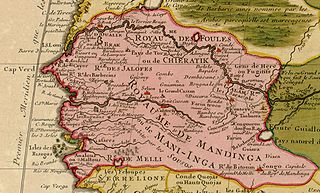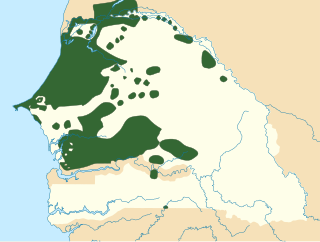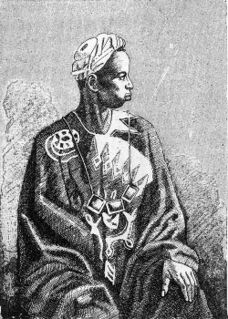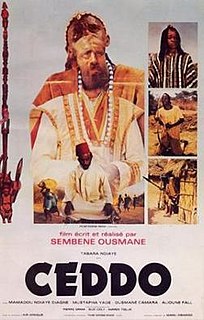Bibliography
- Ndeysaan - The Price of Forgiveness, California Newsreel, Access date: 16 May 2022
- Ndeysaan (The Price of Forgiveness), Educational Media Reviews Online, Access date: 16 May 2022
Related Research Articles

The history of Senegal is commonly divided into a number of periods, encompassing the prehistoric era, the precolonial period, colonialism, and the contemporary era.

Wolof is a language of Senegal, Mauritania, and the Gambia, and the native language of the Wolof people. Like the neighbouring languages Serer and Fula, it belongs to the Senegambian branch of the Niger–Congo language family. Unlike most other languages of the Niger-Congo family, Wolof is not a tonal language.

The Jolof Empire, also known as the Wolof or Wollof Empire, was a West African state that ruled parts of modern-day Senegal from 1350 to 1549. Following the 1549 battle of Danki, its vassal states were fully or de facto independent; in this period it is known as the Jolof Kingdom.

A griot is a West African historian, storyteller, praise singer, poet, or musician. The griot is a repository of oral tradition and is often seen as a leader due to their position as an advisor to royal personages. As a result of the former of these two functions, they are sometimes called a bard.

Ousmane Sembène, often credited in the French style as Sembène Ousmane in articles and reference works, was a Senegalese film director, producer and writer. The Los Angeles Times considered him one of the greatest authors of Africa and he has often been called the "father of African film". Descended from a Serer family through his mother from the line of Matar Sène, Ousmane Sembène was particularly drawn to Serer religious festivals especially the Tuur festival.

Orchestra Baobab is a Senegalese band established in 1970 as the house band of the Baobab Club in Dakar. Many of the band's original members had previously played with Star Band de Dakar in the 1960s. Directed by timbalero and vocalist Balla Sidibé, the group featured saxophonists Issa Cissoko and Thierno Koité, two singers, two guitarists and a rhythm section with drums, congas and bass guitar. Since their formation, the band has predominantly played a mix of son cubano, Wolof music, and to a lesser extent Mande musical traditions. Following the deaths of Cissoko in 2019 and Sidibé in 2020, Thierno Koité has become the leader of the band.

Rufisque is a city in the Dakar region of western Senegal, at the base of the Cap-Vert Peninsula. It has a population of 179,797. In the past it was an important port city in its own right, but is now a suburb of Dakar.

Doudou Ndiaye Rose was a Senegalese drummer, composer and band leader, and was the recognized modern master of Senegal's traditional drum, the sabar. He was the father of a musical dynasty that includes some of the most successful traditional musicians of contemporary West Africa. He was one of the first musicians to bring Senegalese traditional music to the attention of the world.

The Wolof people are a West African ethnic group found in northwestern Senegal, the Gambia, and southwestern coastal Mauritania. In Senegal, the Wolof are the largest ethnic group (~43.3%), while elsewhere they are a minority. They refer to themselves as Wolof and speak the Wolof language, in the West Atlantic branch of the Niger–Congo family of languages.
Mbalax is the national popular dance music of Senegal and the Gambia. In the 1970s, mbalax emerged as the distinctive sound of postcolonial Senegal. Derived from a fusion of indigenous Wolof sabar drumming with popular music principally from the African diaspora and African popular music, and to a lesser extent Western pop and afropop. Although the fusion of indigenous music with urban dance music from the diaspora and west is not new, the pan-ethnic quality of urban Wolofness provided a space for the inclusion and representation of a plethora of ethnic sounds of the Pulaar/Tukulor, Sereer, Soce, Mande and other groups from the Greater Senegambia Region. The name mbalax derives from the accompanying rhythms of the Wolof sabar and was coined by Youssou N'Dour even though, as he has stated, there were many other groups in urban Senegal fusing these traditional sounds with modern music.
Mbaye Dieye Faye is a singer and a Senegalese percussionist.

Alioune Mbaye Nder is a Senegalese singer. Nder takes his name from the n'der, the drum favoured by his griot father.

Adanggaman is a 2000 historical drama film directed by Roger Gnoan M'Bala. It was an international co-production between the Ivory Coast, Burkina Faso, Switzerland, Italy and France.
The Kingdom of Sine was a post-classical Serer kingdom along the north bank of the Saloum River delta in modern Senegal. The inhabitants are called Siin-Siin or Sine-Sine.

Women in Senegal have a traditional social status as shaped by local custom and religion. According to 2005 survey, the female genital mutilation prevalence rate stands at 28% of all women in Senegal aged between 15 and 49.

Lingeer was the title given to the mother or sister of a king in the Serer kingdoms of Sine, Saloum, and previously the Kingdom of Baol; and the Wolof kingdoms of Cayor, Jolof, Baol and Waalo in pre-colonial Senegal. The word "Lingeer" means "queen" or "princess" in Serer and Wolof language. The Lingeer was considered the “great princess of royal courts.” These kingdoms utilized a bilineal system, as a candidate for kingship could not succeed to the throne if he was not a member of the reigning materlineage, and thus, the Lingeer's maternal lineage was highly significant. In similarity, a candidate could not succeed to the throne as king if he was not a member of the noble reigning patriclans. That was particular so among the Serer who retained much of their old culture, customs and traditional religion where women played a significant role compared to the Wolof who adopted Islam. Various Lingeers have been noted for their resistance efforts to colonial conquest.

Ceddo, also known as The Outsiders, is a 1977 Senegalese drama film directed by Ousmane Sembène. It was entered into the 10th Moscow International Film Festival.
The following is a timeline of the history of the city of Dakar, Senegal.
Events in the year 2020 in Senegal.
References
- ↑ Wolof Grammar Manual, Section: "Wolof Grammar Notes: Exclamatives" - Page: 55, in wolofsources (Citation; "Ndeysaan! / Andaysaan: Oh dear! [Sign of pity]")
- ↑ Wolof Glossary - Page: 4, The African Studies Center (ASC) at Boston University (Citation; "Ndeysaan: gosh, what a shame, “Awww” [interjection of pity or sympathy]")
- ↑ The Price Of Forgiveness / Ndeysaan, African Film Festival - New York, Access date: 16 May 2022
- ↑ Le Prix du Pardon - Mansour Sora Wade, Objectif Cinema, Marc LEPOIVRE (in French), Access date: 16 May 2022
- ↑ The Price of Forgiveness, Jonathan Holland, Variety, 21 December 2001